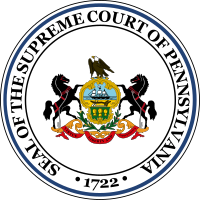Pennsylvania Supreme Court
| Supreme Court of Pennsylvania | |
|---|---|
 |
|
| Established | May 22, 1722 |
| Country | Pennsylvania, United States |
| Location |
Harrisburg Pittsburgh Philadelphia |
| Composition method | Partisanly elected, retained by yes/no vote |
| Authorized by | Pennsylvania Constitution |
| Judge term length | 10 years |
| Number of positions | 7 |
| Website | Official website |
| Chief Justice | |
| Currently | Thomas G. Saylor |
| Since | January 6, 2015 |
| Lead position ends | December 2017 |
| Jurist term ends | December 2017 |
The Supreme Court of Pennsylvania is the highest court in the Commonwealth of Pennsylvania. It also claims to be the oldest court in the United States, which claim is disputed by the Massachusetts Supreme Judicial Court. The Supreme Court of Pennsylvania began in 1684 as the Provincial Court, and casual references to it as the "Supreme Court" of Pennsylvania were made official in 1722 upon its reorganization as an entity separate from the control of the royal governor. Today, the Supreme Court of Pennsylvania maintains a discretionary docket, meaning that the Court may choose which cases it accepts, with the exception of mandatory death penalty appeals, and certain appeals from the original jurisdiction of the Commonwealth Court. This discretion allows the Court to wield powerful influence on the formation and interpretation of Pennsylvania law.
The original Pennsylvania constitutions, drafted by William Penn, established a Provincial Court under the control of his British governors. The General Assembly, however, espoused the principle of separation of powers and formally called for a third branch of government starting with the 1701 Judiciary Bill. In 1722, the appointed British governor needed the House to raise revenues. House leaders agreed to raise taxes in return for an independent Supreme Court.
Predating the United States Supreme Court by 67 years, Pennsylvania's highest court was established by the General Assembly on May 22, 1722. Interpreting the Pennsylvania Constitution, it was the first independent Supreme Court in the United States with the power to declare laws made by an elected legislative body unconstitutional.
The court meets in Philadelphia, Pittsburgh, and Harrisburg, Pennsylvania.
...
Wikipedia
